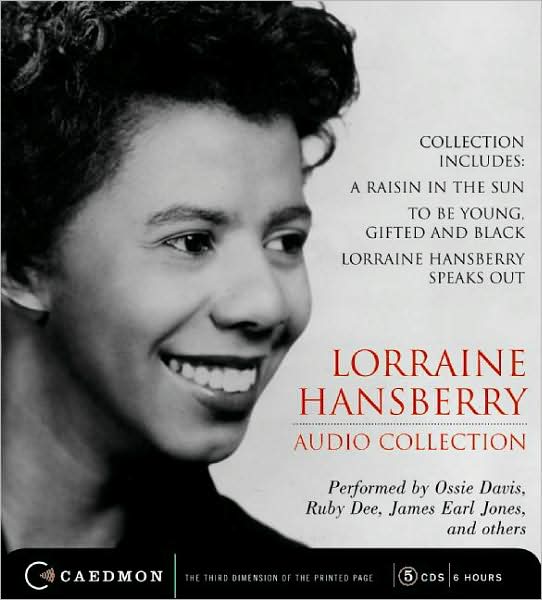In Honor of Lorraine Hansberry
(1930-1965)
In honor of the 81st anniversary of the birth of playwright Lorraine Hansberry, on May 19th, 2011, above is the audio of a May 8, 1959 interview of Lorraine Hansberry by Mike Wallace who asks her some very socially relevant questions about aspirations of the Negro middle class and Black Nationalism. This interview is available on the LORRAINE HANSBERRY AUDIO COLLECTION (cover photo available from amazon.com) produced by Caedmon, an imprint of HarperCollins. An incredibly important collection. -RF.
__________________________

LORRAINE HANSBERRY
Mini-Documentary
Lorraine Hansberry (May 19, 1930[1] -- January 12, 1965) was an African American playwright and author of political speeches, letters, and essays.[2] Her best known work, A Raisin in the Sun, was inspired by her family's legal battle against racially segregated housing laws in the Washington Park Subdivision of the South Side of Chicago during her childhood.[3]
Hansberry attended the University of Wisconsin--Madison, but found college uninspiring and left in 1950 to pursue her career as a writer in New York City, where she attended The New School.[4] She worked on the staff of the black newspaper Freedom under the auspices of Paul Robeson, and worked with W. E. B. DuBois, whose office was in the same building.[4] A Raisin in the Sun was written at this time, and was a huge success. It was the first play written by an African-American woman to be produced on Broadway. At 29 years, she became the youngest American playwright and only the fifth woman to receive the New York Drama Critics Circle Award for Best Play.[5] While many of her other writings were published in her lifetime - essays, articles, and the text for the SNCC book The Movement, the only other play given a contemporary production was The Sign in Sidney Brustein's Window.[6] In 1961, Hansberry was set Vinnette Carroll as the director of the musical, Kicks and Co, after its try-out at Chicago's McCormick Place. It was written by Oscar Brown, Jr. and featured an interracial cast including Lonnie Sattin, Nichelle Nichols, Vi Velasco, Al Freeman, Jr., Zabeth Wilde and Burgess Meredith in the title role of Mr. Kicks. A satire involving miscegenation, the $400,000 production was co-produced by her husband Robert Nemiroff; despite a warm reception in the Windy City, the show never made it to Broadway.[7] After a long battle with pancreatic cancer[8] she died on January 12, 1965, at the age of 34.[6] According to James Baldwin, Hansberry was prescient about many of the increasingly troubling conditions in the world, and worked to remedy them with literature. Baldwin believed "it is not at all farfetched to suspect that what she saw contributed to the strain which killed her, for the effort to which Lorraine was dedicated is more than enough to kill a man."[9] Hansberry's funeral was held in Harlem on January 15, 1965. Paul Robeson gave her eulogy. http://en.wikipedia.org/wiki/Lorraine...__________________________
From Riots to Renaissance:
Hansberry's Victory
Chicago native and author Lorraine Hansberry drew on childhood experiences to write her acclaimed novel-turned-play A Raisin in the Sun, in which a black family faces discrimination after buying a home in an all-white neighborhood.
Hansberry was nearly eight years old when her father, Carl Hansberry, decided to purchase a three-flat at 6140 S. Rhodes in the white neighborhood of Woodlawn, and challenge the restrictive housing covenant that kept blacks from renting, leasing, or buying property in the community. Shortly after moving in, the Hansberrys were evicted based on the covenant. Mr. Hansberry then waged a three-year legal battle for the right to live in his home. The case,Hansberry vs. Lee, resulted in a 1940 Supreme Court decision that helped to end racially discriminatory housing covenants across the city of Chicago.
Recalling the times she and her siblings would go to eat at a "whites-only" restaurant, Ms. Hansberry said, "Sometimes you were shaken a bit, but you did it because you knew your dad was going to come back you up." Her play A Raisin in the Sun has the distinction of being the first drama written by a black woman to be produced on Broadway.
The Chicago City Council designated the Hansberry family home a landmark on February 10, 2010 in recognition of Ms. Hansberry's contribution to the Black Renaissance Literary Movement of the 20th Century.
>via: http://www.wttw.com/main.taf?p=76,4,4,10

